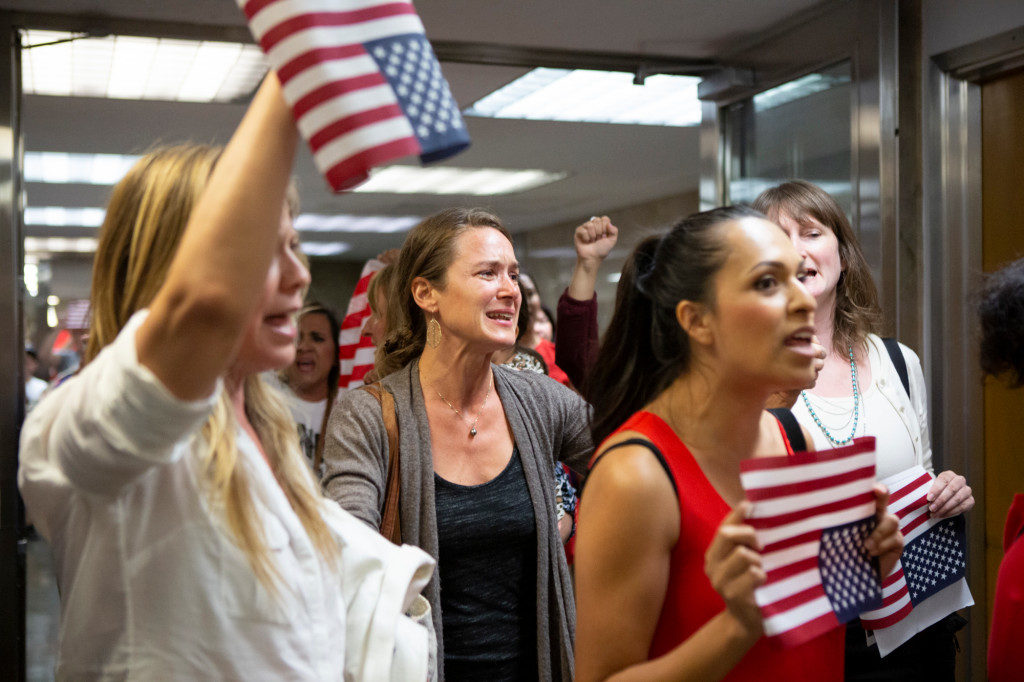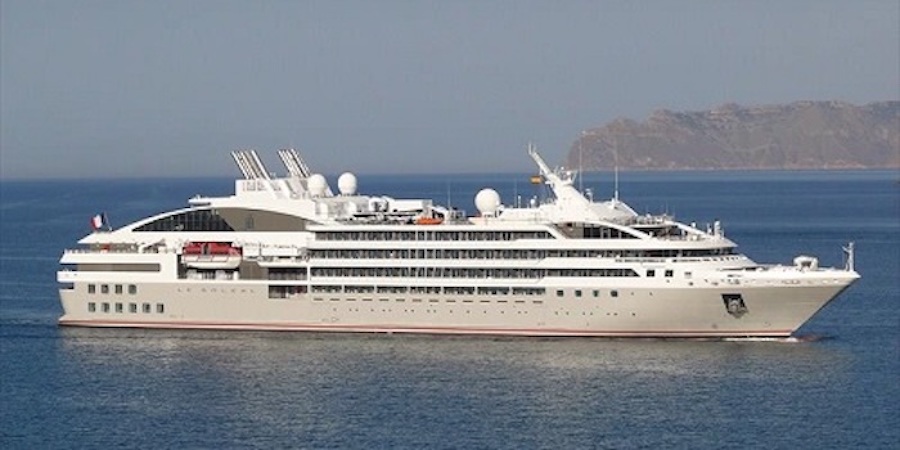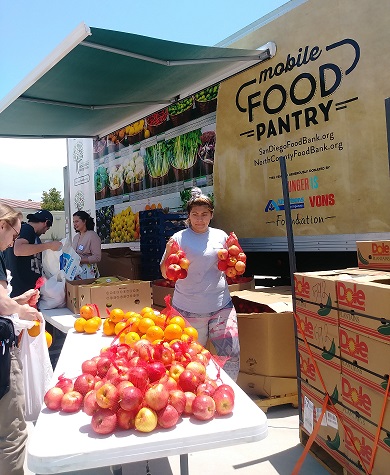Daily Business Report-Sept. 11, 2019
San Diego is in the midst of a political evolution.
Commentary:
Hot politics in the cul-de-sac (San Diego)
By Dan Walters | CalMatters Columnist

Spanish explorer Juan Rodriguez Cabrillo claimed California 477 years ago this month when his three-ship armada sailed into a bay he named “San Miguel,” which we know today as San Diego.
Nearly a half-millennium later, San Diego is California’s second-largest city, but in a sense remains an isolated, almost self-contained, outpost.
An ocean to the west, an international border to the south, a mountainous and forbidding desert to the east and the Marine Corps’ massive Camp Pendleton to the north wall off San Diego from the rest of California.
True-believing San Diegans cherish the barriers as protecting them from Los Angeles and hatred of the colossus to the north permeates local consciousness and politics.
As it happens, San Diego is in the midst of a political evolution. The city and the surrounding San Diego County have been politically conservative for most of its history, and the rural portions of the county still are. But the city has turned blue, thanks to a political awakening of its Latino population, organizational efforts by unions and demographic and economic changes.
Kevin Faulconer, the latest in a long, but not unbroken, string of Republican mayors, is nearing the end of his tenure and the next mayor will almost certainly be a Democrat, with Assemblyman Todd Gloria and city Councilwoman Barbara Bry the chief contenders.
The early skirmishing between the two reflects San Diegans’ endemic fears of being victimized by powerful interests outside of the city.
Bry is positioning herself as the protector of San Diego’s single-family neighborhoods against efforts by rapacious developers and politicians in Sacramento to force it to accept higher-density housing.
She accuses Gloria of doing their bidding by voting for a controversial bill that would allow some housing projects to bypass local regulation. The legislation, Senate Bill 330, was sent to Gov. Gavin Newsom’s desk last week.
As SB 330 was going to the governor, however, Gloria ginned up another bill in the final days of the legislative session that simultaneously plays on San Diegans dislike of Los Angeles and benefits his labor union backers.
His Assembly Bill 1290, also supported by Toni Atkins, a San Diegan who is the state Senate’s top leader, would allow a “project labor agreement” for Pure Water San Diego, a project to make the city less dependent on outside water supplies by reprocessing wastewater.
San Diego has been trying for decades to wean itself from water supplied by the Metropolitan Water District of Southern California, which is dominated by Los Angeles. The feud between San Diego and The Met, as it’s known, has been waged in the Legislature and in the courts.
Pure Water San Diego has been stalled by an apparent conflict with a 2012 city ballot measure — a holdover from the city’s conservative past — that makes it illegal to mandate project labor agreements on public works projects, unless required by state or federal law.
The mayoral contest, however, will not be the only election next year that reflects San Diego’s political evolution.
Democratic Congresswoman Susan Davis announced last week that she will retire after her current term ends, touching off a scramble among local Democratic politicians.
Meanwhile, in the still-conservative, semi-rural San Diego suburbs, Republican Congressman Duncan Hunter says he’s running for a seventh term even though he’s been indicted on federal charges of misusing campaign funds for personal expenses. He could face a stiff challenge from several Republican figures.
California’s cul-de-sac, as some term San Diego, will be a cauldron of high-stakes politics next year.
CalMatters is a public interest journalism venture committed to explaining how California’s state Capitol works and why it matters. For more stories by Dan Walters, go to calmatters.org/commentary
______________________

Governor signs vaccine legislation
while opponents clogged Capitol
Gov. Gavin Newsom signed legislation Monday aimed at stopping bogus medical exemptions for vaccines, as anti-vax protesters clogged Capitol hallways and disrupted legislative sessions with loud chants.
Newsom’s statement: “This legislation provides new tools to better protect public health, and does so in a way that ensures parents, doctors, public health officials and school administrators all know the rules of the road moving forward.”
Newsom wavered on the issue earlier in the summer and again last week, insisting on last-minute amendments.
The Legislature passed the bills on near party-line votes, with nearly all Democrats supporting them and Republicans voting no.
Sen. Richard Pan, a pediatrician and author of the legislation, said in a statement: “I thank the governor for standing with science, and once again making California a leader in safeguarding children and communities.”
The L.A. Times: The bills come amid the worst measles outbreak in more than 20 years, with more than 1,200 people diagnosed with the disease this year in the United States.
— Dan Morain, CALmatters
______________________

Port of San Diego gears up for start
of cruise season with new cruise offerings
The Port of San Diego is gearing up for the start of its 2019/2020 cruise season, which will feature the Port’s long-term partners Holland America Line and Disney Cruise Line, as well as the return of Carnival Cruise Line and add some additional cruise offerings. The new season officially begins today with the arrival of Le Soleal, a luxury vessel from the French cruise company, Ponant. Le Soleal will be journeying to the Sea of Cortez on a 14-day cruise.
This season, the Port of San Diego has 104 cruise calls scheduled, up from the 92 in 2018/2019. Those 104 cruise calls will bring approximately 338,000 passengers, up from last season’s 295,000.
Disney Cruise Line will be offering 16 cruises from the Port of San Diego, beginning on Oct. 4 with its popular Halloween on High Seas Baja Cruise. Cruises on the Disney Wonder include two-night, four-night and five-night Baja cruises, seven-night Mexican Riviera cruises, a 14-night Very Merrytime Panama Canal Cruise and a five-night Pacific Coast Cruise.
Carnival is bringing the Carnival Miracle to the Port beginning Dec. 1, 2019 for 12 cruises. Itineraries include seven-day Mexican Riviera cruises; 14 and 15-day Hawaiian Island cruises; three, four, five and six-day Baja Mexico cruises and a 13-day Panama Canal cruise among others.
Other cruise lines sailing from the Port of San Diego include Holland America Line, with cruises that vary from a 28-day Incan Empires cruise and a 28-day Hawaii, Tahiti and Marquesas tour, to Mexican Riviera and California Coast tours
Each homeported cruise, which is a cruise that begins and ends in San Diego, has an average of $2 million in economic impact to the region, according to Port officials.
______________________
Illumina wins Patent Office action,
invalidating Columbia University patent
Genomeweb
Illumina has successfully challenged a patent awarded to Columbia University for next-generation sequencing technology, leading a U.S. patent court to deem the claims unpatentable.
According to a final written decision released Monday, a three-judge PTAB panel ruled that Illumina had successfully shown in inter partes review (IPR) that both claims of U.S. Patent No. 9,868,985, for a “Massive parallel method for decoding DNA and RNA,” were unpatentable. The claims were deemed “obvious” over prior art, the judges wrote.
The decision is the latest PTAB victory for Illumina against Columbia; the San Diego sequencing giant has prevailed in at least four other IPRs since 2018.
Columbia will likely be able to appeal Monday’s PTAB decision. It has appealed four other IPR decisions to the U.S. Court of Appeals for the Federal Circuit.
Columbia and Illumina did not immediately respond to request for comment.
Columbia was awarded the ‘985 patent in 2018. It’s unclear whether Columbia has sued Illumina for infringing that patent. However, Columbia has sued Illumina multiple times over patents for sequencing technology, beginning in 2012. Illumina countersued and also sued Qiagen, which had licensed patents from Columbia.
In Monday afternoon trading on the Nasdaq, shares of Illumina were down just over 1 percent at $266.75.
______________________
Microlender Accion will celebrate
its 25th anniversary on Oct. 3
Accion, a nonprofit microlender offering business loans up to $75,000, will celebrate its 25th anniversary on Thursday, Oct. 3. Established in 1994, the organization supports hundreds of small businesses annually and has provided more than 4,400 loans totaling nearly $40 million in its 25-year history.
The anniversary event will be from 5:30 to 8 p.m. at the Sempra Energy building in Dowtown San Diego.
When the organization launched locally, it started with a handful of staff and made five loans totaling $6,000 in its first year. It has since grown to employ more than 25 staff and serves four counties: Imperial, Riverside, San Bernardino and San Diego. In 2018, Accion lent $4.7 million with 308 loans to business owners and it experienced a 41 percent increase of number of loans funded and a 31 percent increase in dollars funded over 2017.
The event will feature a marketplace of client vendors, where attendees will get the chance to shop and visit Accion entrepreneurs from throughout the years. Everyone who attends the event will receive a $5 voucher to spend on any of the numerous vendors who have been supported by Accion.
Tickets range from $50-$75 plus fees. For more information, visit: Accion25.eventbrite.com.
______________________
CORRECTION:
An item in Tuesday’s Daily Business Report erroneously stated that the Living Coast Discovery Center had received a $85.9 million grant from the U.S. Fish & Wildlife Service. The grant was actually for $85,990. SD METRO regrets the error.
______________________

MiraCosta College opens new Mobile
Food Pantry to serve hungry students
MiraCosta College has launched a new Mobile Food Pantry to complement services that already include a MiraCosta Cares Farmers Market and a long-established campus pantry that provides an emergency sack lunch or snack for any student in need of a meal.
The Mobile Food Pantry made its inaugural campus visit on July 23, serving 70 students at the Veterans Lounge and EOPS Center. It is stationed at the Oceanside Campus Library Hub Circle next to the Administration Building. Upcoming scheduled dates are Sept. 24, Oct. 22, Nov. 26, Jan. 28, Feb. 28, March 24, and April 28 from 1 to 2 p.m.
The Mobile Food Pantry evolved through discussions with MiraCosta College Superintendent/President Sunita “Sunny” Cooke and San Diego Food Bank CEO Jim Floros, and it is delivering more than meals. Also on the menu is information about the CalFresh program and access to a nutritionist about healthy eating and community resources. The Jacobs & Cushman San Diego Food Bank is the largest hunger- relief organization in the county, and it works with several colleges and universities in the region.
Students must show their Spartan Pass or have their SURF ID number to collect food from either the Mobile Food Pantry or Farmers Market.
______________________
San Diego State University to launch
comprehensive strategic planning process
Hundreds of campus and community members are slated to attend the Sept. 23 kickoff of San Diego State University’s strategic planning process and the discussion group sessions that will immediately follow.
The effort marks the first comprehensive, all-university strategic planning process involving all levels and all areas of campus. The kickoff event will be held Monday, Sept. 23, from 8:15 to 9 a.m. in Montezuma Hall of the Conrad Prebys Aztec Student Union.
Following the kickoff, a series of discussion group sessions will take place over a three-day period from Sept. 23 through Sept. 25. All members of the campus community, including alumni and SDSU parents and families, are encouraged to register to attend a session via an online form (an RSVP is not required to attend the kickoff event).
At the close of the year-long initiative, SDSU will have a single plan for the main campus, SDSU Imperial Valley and the proposed development of SDSU Mission Valley. This plan will also incorporate University Senate resolution-defined principles related to diversity, equity and inclusion.
______________________

Cal State San Marcos receives nearly
$2 million to help increase STEM graduates
Cal State San Marcos has received a grant of almost $2 million from the National Science Foundation to conduct research that will help increase the number of students graduating with college degrees in STEM disciplines.
The grant of $1.9 million covers five years and was awarded to a group of researchers headed by Dr. Wesley Schultz, a psychology professor and the dean of the Office of Graduate Studies and Research at CSUSM. Schultz will lead the project alongside Dr. Anna Woodcock, research faculty in the CSUSM psychology department, and Dr. Paul Hernandez, a professor at Texas A&M University and a CSUSM alumnus.
Schultz and his team will aim to answer the question of how the development of an identity as a scientist affects a student’s persistence and success within a STEM discipline, and how that identity aligns with the student’s other identities.


